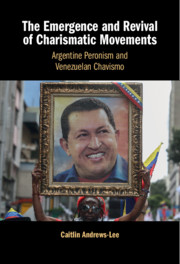The Emergence and Revival of Charismatic Movements
Political movements founded by charismatic leaders are often considered ephemeral. Existing literature argues that because they rest on unmediated, emotional attachments between leaders and followers, these movements either fade quickly after their leaders disappear or transform into routinized parties. Yet, charismatic movements around the world have proven surprisingly resilient and have retained their personalistic core. Focusing on Argentine Peronism and Venezuelan Chavismo, this book investigates the nature and trajectory of charismatic movements from the perspectives of both leaders and followers. Using interviews, focus groups, and survey experiments, Caitlin Andrews-Lee reveals that charismatic movements can emerge, survive, and become politically revived by sustaining – not discarding – their personalistic character. Followers? charismatic attachments to the movement founder can develop into an enduring, deeply affective political identity that successors can reactivate under certain conditions by portraying themselves as symbolic reincarnations of the founder. Consequently, charismatic movements can have lasting, deleterious effects on democracy. This title is also available as Open Access on Cambridge Core.
Caitlin Andrews-Lee is Assistant Professor of Politics and Public Administration at Ryerson University. Previously, she was a postdoctoral fellow at the Center for Inter-American Policy and Research (CIPR) at Tulane University. She has published articles on charismatic politics, political behavior, and democracy in journals such as Comparative Political Studies, Comparative Politics, Political Research Quarterly, and Journal of Politics in Latin America.

